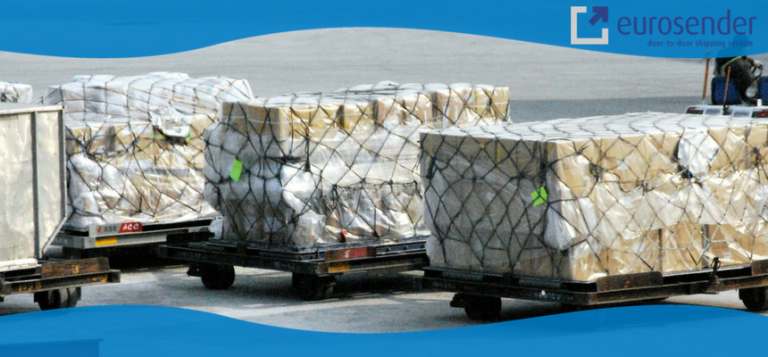11 Strategies for Freight Cost Optimisation
TL;DR
- Establish steady lane volumes with carriers to improve efficiency and reduce costs through regular freight flow.
- Optimize shipping schedules by choosing off-peak days and offering later pick-up times to help carriers maximize their routes.
- Consolidate smaller shipments and minimize packaging to reduce shipping costs, while ensuring proper load times for faster processing.
- Consider outsourcing freight management to a reliable partner like Eurosender for optimized rates and efficient logistics solutions.
Shippers often assume that freight transport and the associated costs are “fixed” and cannot change. This perception is wrong. There are, in fact, several ways to optimise freight costs for your business. These changes can be implemented immediately, helping you lower freight costs by up to 50%. This article will explore practical ways to reduce freight costs in the long term.
Click to ship up to 70% cheaper
11 proven ways to reduce your freight shipping costs
1. Contract steady lane volumes
If there is regular work for the carrier on a daily basis, with a regular freight flow on the same route, the carrier will market those backhauls and build out a customised network. As a result, your freight costs will be optimised and reduced because the carrier will be more efficient. Carriers will normally focus on moving freight of customers who are loyal and offer them reliable freight volumes. Developing a regular, steady lane volume helps to optimise and reduce freight costs.
2. Ship on off-peak days
Shipping a day earlier or later can often yield measurable savings. Friday is usually an off-peak day for shipping consumer goods because most customers get their products in stores by Thursday, so that items can be put on the shelves on Friday, ready to be sold over the weekend.
Mondays can also be low-volume days when carriers are looking for business. However, a lot will depend on your specific cargo and industry. For example, canned goods will survive longer than fresh goods if we compare products from the food industry. Shipping off-peak days is a great option for shippers of non-consumer type products.
3. Consolidate smaller shipments
Retail consolidation is a great way to optimise freight costs – combine your LTL shipments with other nearby companies shipping to the same mass retailers for direct delivery. A win-win solution for all. Colgate and CVS are examples of larger shippers that have gotten into retail consolidation.
Why is consolidation good?
Suppliers pay only for their share of a less-expensive LTL shipment. Retailers receive loads on time and get the same volume of goods in fewer, fuller loads to keep their dock bays open and labour costs low. Local Chambers of Commerce or other business organisations are one place where shipper-partners can be found. You also have the option of working with a 3PL under a freight consolidation program that serves multiple companies shipping to the same retail customers.
Read also:
- The definition of consolidation
- What is consolidated shipment delivery?
- Freight consolidation: meaning and benefits
4. Develop relationships instead of being a serial rate shopper
Severing relationships with carriers and starting fresh ones with new carriers every year is not the best approach to reducing freight costs, even if you’re trying to prove a point to your management. This is the freight equivalent of “speed dating.” When shippers develop more strategic, longer-term relationships with carriers, they in fact create transport management advantages that have bottom-line implications.
Long-term contracts allow carriers the time they need to establish other customers in the area, creating a more efficient network with minimal deadhead miles. A carrier that maximises assets is more profitable and can offer you better rates.
Another advantage of a longer-term contract (or about 3 years) is that it also locks in that rate for the contract period. This protects the shipper from market inflation and fluctuation. Carriers committed to long-term contracts provide better services, which has a significant impact in the long run.
Read more about:
5. Increase shipping lead times
Introduce planning into the supply chain to maximise operations. If you give advance notice to the carrier about future loads, it enables them to organise their assets and resources (including trucks, drivers and warehousing space). One of the greatest costs for carriers is if they have to pay for a trailer to wait idly at a loading facility.
Better planning allows carriers to reduce unnecessary costs that you would be expected to cover. Planning can be improved and implemented on all aspects of the supply chain – pick up, staging, and live-loading. The more notice you give, the more carriers can do behind the scenes to be more efficient and offer you lower freight costs.
6. Reduce dunnage
Many products require packaging such as airbags, strapping, blocking and bracing to prevent them from knocking together during long-distance transport via road freight or sea freight. But sometimes shippers try to protect their products too much.
Carriers can help you reduce unnecessary dunnage and, in turn, reduce your freight costs – without increasing damage. We do recommend getting packaging advice if you are unsure how to optimise your methods. Dimensional weight pricing strategies from carriers help shippers to achieve the right size packaging.
7. Faster loading
When carriers calculate freight shipping rates, they usually assume a 2-hour window for loading. But if the carrier knows they’re collecting cargo at a place where loading will be finished in an hour, that will have a positive impact on the rate. The carriers are inclined to work with shippers that have a lower price and a faster window for loading.
Consistent load time performance not only helps shippers lower their freight costs, but it can actually become a set rate. This avoids the need to chase down assessorial charges, which is a huge time drain. Efficiently managing operations saves money, creates a good creditability status for shippers and enhances their popularity with carriers.
8. Offer later pick-up times
Pick-ups in the late afternoon or evening are quite an advantage. Since most other shippers will have closed their docks between 6 pm and 12 pm, this gives carriers an opportunity to make the load into a backhaul. A carrier might need to turn down a load that is requested to be picked up mid-morning because it conflicts with another collection or delivery.
However, later pick-ups allow carriers to perform the delivery and fill their backhaul with your freight. This helps the carrier to maximise the use of assets, especially on longer hauls, and results in reduced freight costs.
You may also be interested in:
9. Minimise the number of pallet spaces needed when shipping LTL
Boxing your product differently can help make it easier to get more cargo packed onto a pallet and into a trailer. Optimising the cube shape of a parcel is a great way of helping with stacking it in pallets so you end up with less dead space. For example, if you pack a small item in a large box, then not many boxes can be put on a pallet, but if you have them in small boxes, you can load the pallet more fully to save trailer space.
10. Reduce freight costs by shipping more with less frequency
Shipping larger orders helps to optimise time and resources and brings down costs. Encourage customers to take larger orders. It is much cheaper to ship six pallets at once than to ship two pallets every other day.
Unfortunately, retailers look for smaller shipments more often. If you create incentives for them to take more inventory than they think they need is a way to get lower freight costs. You can offer to share freight savings with the retailer as an incentive. Another incentive is to consider Vendor Managed Inventory, where the retailer is not charged for the item until it is actually on the shelf.
11. Work with a reliable shipping partner such as Eurosender
Freight management is not a core competency for smaller companies. Hiring, training and maintaining a transport staff, and keeping up with systems requirements, is expensive and time-consuming.
Outsourcing freight management to a reliable shipping partner such as Eurosender removes all the pressures of logistics planning and allows you to focus on your business. Since our prices are pre-negotiated with logistics providers, your freight costs are always optimised.
Interested in learning more about pallet and freight shipping? Check all our articles about pallet deliveries.
Click to ship up to 70% cheaper
About the author






